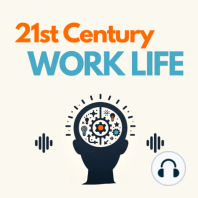59 min listen

WLP297 Sharing and Retaining Knowledge in Your Organisation
WLP297 Sharing and Retaining Knowledge in Your Organisation
ratings:
Length:
45 minutes
Released:
Mar 31, 2022
Format:
Podcast episode
Description
In this bonus episode of the 21st Century Work Life podcast, Ana Neves talks about how she’s structured the conference Social Now, which covers how enterprise social network tools can help organisations in the day to day, ”rather than being an extra thing we have to do”.Your code as listener to get the early bird discount until 8 April is WCL21.The conference started in 2012, and has a fictitious company at its centre. The people in the company have challenges that will resonate with most employees in organisations, and the conference is structured around helping people in the company. Ana blogs as a new employee in this organisation, so that attendees have a background on the case study through the blog http://houseofcables.socialnow.org/ Many organisations have implemented these tools, but are not making the best use of them, being used at a superficial level. Pilar was under the impression that online tools are being used efficiently and deliberately at a team level, but this is not the case. Ana talks about Social Collaboration Maturity Benchmark Report 2021, which shows that teams are still using online tools for videoconferencing and direct messages, but not for what the tools are best, which is working out in the open and documenting. The concepts of “working out loud” or “working in the narrative” are still not being adopted. Eg from I’ve done this document vs I’m working on this document. Work in progress can be useful to others in your team or the organisation, but of course to share this requires a lot of psychological safety. For example, if you’re writing a report over a month, even the first sentences that you write down could already be of use to others. It’s all about having the right culture, not just the right tools. Before the pandemic, the number of direct messages was smaller than during. Before the pandemic, the teams and people using these tools were already behind the concept of working out loud, whereas now they’ve adopted them because that’s all they had. People are afraid of having their work in progress visible to all. At an organisational level, Ana has seen orgs try to compensate for the lack of being together in the physical space. However some of these ways of keeping employees “engaged” sometimes seem purposeless, and focused on the social. If this is not consistent with the organisation’s culture, it jars with people and can be worse than doing nothing. These tools work best when they are used to listen to people and what they have to say, around topics that link back to business. What brings people together is their work, not just their social ties. Creating organisation-wide dialogues about things linked to work eg internal processes, new products is where these tools become valuable. For some employees, it’s difficult to think about some of these spaces where we can have important conversations, not just “watercooler conversations”. The spaces are informal, but you can have good conversations. The key is to evidence that you have been listening, else there’s no point. These tools work best asynchronously and are great for documenting thoughts and ideas that don’t get implemented. For example, “we’ve made this decision, and if you want to look at other ideas that were generated, have a look at this conversation”. This also helps to see who was part of the conversation. It also helps to support the concept of “peer assist”, where people learn from others when they’re kicking off a project. Asynchronous conversations stay as a record for others to 1) identify the people who can help them, and then have a conversation with them and 2) to access thoughts of people who have left the organisation, through their posts19.30 mins Ana talks about the conference Social Now, on the different ways in which these tools can be weaved into how the day to day looks like in organisations. The focus this year is about enabling engaged and high performing teams, aligned with the organisation’s values an
Released:
Mar 31, 2022
Format:
Podcast episode
Titles in the series (100)
WLP19 Team Retrospectives: Today's episode includes a Virtual Coffee with Lisette, where we talk about how to organise and lay down the foundations for useful team retrospectives. (We are borrowing the main aspects from the Agile world.) 00: 30 Pilar has some updates,... by 21st Century Work Life and leading remote teams